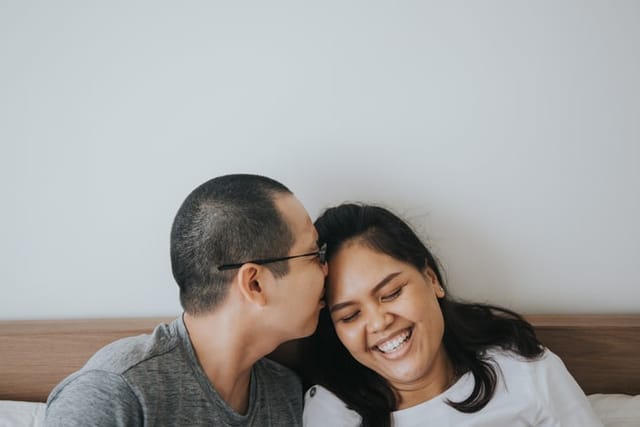Being a good partner isn’t just about romantic gestures and sweet words. It’s about everyday choices that show respect, build trust, and make your partner feel loved and valued. Here’s what to avoid if you want to be the best partner you can be.
1. You wouldn’t constantly put your friends or family before your partner.

Friends and family are super important, but a romantic partner deserves a special kind of priority. If every weekend plan revolves around other people, or every crisis takes precedence over a date night, your partner will inevitably start feeling neglected. A healthy balance means making time and space for your partner to feel like they truly matter in your life as well as maintaining your individuality outside of the relationship, Forbes explains.
You may also like: 12 Signs You’re A Mentally Strong Person Even If You Don’t Think So
2. You wouldn’t hide your phone or get defensive about messages.

A little privacy is totally healthy, but needing to obsessively guard your phone creates an atmosphere of distrust. If innocent texts or social media interactions spark defensiveness or secrecy, it’s a red flag. Good partners should feel comfortable casually glancing at each other’s phones without it sparking a major interrogation.
Don’t miss out – follow Bolde for exclusive content daily
3. You wouldn’t give them the silent treatment.

Stonewalling, or refusing to communicate, is a form of emotional manipulation. Sure, sometimes you need a moment to cool down after a disagreement, but healthy couples always circle back to resolve the issue. Using silence as a weapon of control leaves your partner feeling helpless, unheard, and increasingly resentful.
You may also like: 15 Signs You’re A Complex Thinker Whose Mind Works Differently
4. You wouldn’t bring up past grievances during arguments.

Every couple has disagreements, but good partners focus on resolving the issue at hand. Dragging up old hurts that you’ve supposedly forgiven is a low blow designed to win an argument, not to actually reach a solution. If something has been genuinely resolved and worked through, it shouldn’t be used as ammunition in unrelated fights.
Don’t miss out – follow Bolde for exclusive content daily
5. You wouldn’t make them guess your needs or feelings.

Your partner isn’t a mind reader! While they should strive to be attentive, it’s ultimately your responsibility to communicate your needs clearly and directly. Expecting them to magically know what’s wrong, then getting upset when they don’t, sets you both up for frustration and resentment.
You may also like: If You Have Any Of These 40 Personally Traits, You’re An Extremely Toxic Person
6. You wouldn’t belittle their interests or hobbies.

Even if you don’t share your partner’s love of comic books, tap dancing, or true crime podcasts, good partners are supportive. Mocking their hobbies is like mocking a part of who they are, making them feel embarrassed or small about the things that bring them joy. Healthy couples should encourage each other’s passions, creating space for individuality within the relationship.
Don’t miss out – follow Bolde for exclusive content daily
7. You wouldn’t flirt with other people regularly in front of them.

A little playful banter with friends or coworkers is totally fine, but constantly, overtly flirting with others while your partner is present is incredibly disrespectful. It undermines your relationship and makes your partner feel insecure. Even if you insist it’s “just harmless,” your flirtatious energy should be primarily directed towards the person you’re committed to.
You may also like: 16 Things Introverts Secretly Observe About Everyone They Meet
8. You wouldn’t control who they can or can’t be friends with.

Isolating a partner from their support network is a classic sign of an unhealthy relationship. While you can express concerns about a specific friend if you have genuine reason, trying to dictate your partner’s social circle isn’t your place. Good partners should trust their partner’s judgment and support their existing friendships outside of the relationship.
Don’t miss out – follow Bolde for exclusive content daily
9. You wouldn’t compare them unfavorably to your exes (or anyone else).
Nobody likes being compared, especially in a romantic context. It makes your partner feel inadequate and fosters resentment instead of building them up. Focus on appreciating who your partner is right now, without constantly bringing past relationships or idealized “what-ifs” into the picture.
You may also like: 15 Things Introverts Do That Come Across As Rude But Really Aren’t
10. You wouldn’t guilt-trip them into staying with you.

Threats of self-harm, manipulative promises of change, or grand, dramatic gestures designed to prevent a breakup are signs of emotional blackmail, per Healthline. Good partners want each other to stay because they’re genuinely happy and fulfilled in the relationship, not because they feel obligated or trapped. A healthy relationship shouldn’t come with that kind of intense emotional pressure.
Don’t miss out – follow Bolde for exclusive content daily
11. You wouldn’t withhold affection or intimacy as punishment.

Love and physical touch shouldn’t be used as bargaining chips when you’re upset. Sulking, refusing closeness, or withdrawing affection is a way to exert control, not address relationship problems in a healthy way. Good partners communicate directly about issues instead of playing manipulative games with intimacy.
You may also like: 16 Cute Personality Traits Women Love In Men
12. You wouldn’t go through their belongings without permission.

Even in committed relationships, a sense of privacy and respect for boundaries is crucial. Snooping through your partner’s phone, emails, bag, or drawers shows a fundamental lack of trust. If you have genuine concerns or suspicions, a direct and honest conversation is always healthier than resorting to secretive snooping.
Don’t miss out – follow Bolde for exclusive content daily
13. You wouldn’t lie, even about seemingly “small” things.

Little white lies might seem harmless at first, but they chip away at the foundation of trust over time, Fast Company notes. Good partners strive for honesty, even when it’s difficult or they think it might spare their partner’s feelings. A pattern of lying, no matter how minor it might seem, makes your partner question everything you say, undermining your entire relationship.
You may also like: Evil People: 21 Things They Do & How To Deal With Them
14. You wouldn’t shame them about their body or appearance.

Your partner should feel safe, attractive, and unconditionally loved around you. Critiquing their looks, weight fluctuations, or clothing choices erodes their self-esteem and damages the intimacy within your relationship. Good partners focus on building their partner up, celebrating their beauty, and making them feel cherished exactly as they are.
Don’t miss out – follow Bolde for exclusive content daily
15. You wouldn’t take them for granted.
 iStock
iStock
Even in long-term, stable relationships, appreciation needs expressing. When you start assuming your partner knows you love and value them, complacency and routine can creep in. Good partners verbalize their gratitude, make an effort to surprise each other, and never let the spark of their relationship completely fade.
Enjoy this piece? Give it a like and follow Bolde on MSN for more!




